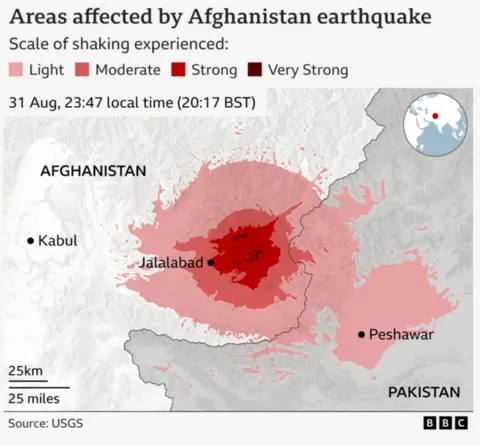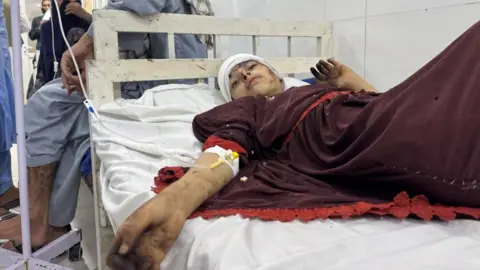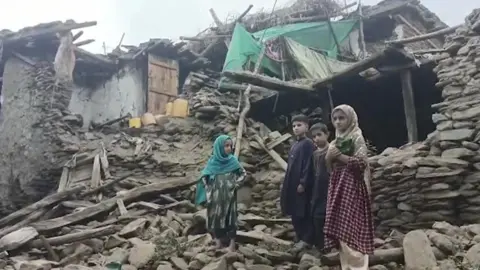High upon a hill in the capital city of Kabul lies a secluded mental health facility known as Qala, specifically designed for women battling mental illness. Operated by the Afghan Red Crescent Society, this centre is one of the few in the country where women suffering from mental health issues can receive care. However, with its current capacity hampered by overwhelming demand—104 women are currently housed within its walls—staff members find it increasingly challenging to provide adequate support.
Among the women is Mariam, a victim of domestic violence who has lived in Qala for over nine years. Abandoned by her family due to cultural beliefs that restrict young women’s movement, Mariam is trapped in this facility, longing for a chance at freedom but lacking a safe place to go. "I want to marry someone here in Kabul," she shares, but hopes for a future outside Qala remain tenuous.
Simultaneously, Habiba, 28, struggles with similar challenges. Her husband recently abandoned her after taking a second wife, leaving her with no support and separated from her three sons. With restricted access to technology, she has no way to reach out to her children and feels a deep sense of loss.
The facility struggles under Taliban-imposed regulations that limit women's mobility, thereby exacerbating crises in mental health care availability. A significant percentage of Afghan women are dependent on male relatives due to longstanding patriarchal structures, further trapping many, including Habiba and Mariam, in cycles of abuse and neglect.
Amidst despair, some patients have spent decades within the centre, abandoned by relatives who have long stopped visiting. According to psychotherapist Saleema Halib, cases of women living and dying in Qala are all too common, as stigma surrounding mental health remains deep-seated in Afghan society.
Due to strict Taliban regulations, many women are unable to access mental health services outside of Qala. The facility is overwhelmed, with a waiting list growing as reports of mental health issues escalate. This situation is reflective of a broader trend across the country, where 68% of women report experiencing poor mental health, as per recent UN surveys.
Dr. Abdul Wali Utmanzai, a leading psychiatrist, corroborates these claims, stating that an overwhelming number of his patients face significant mental health challenges rooted in financial instability and family crises. Many desire assistance but feel crippled by the regulations limiting their freedom.
Qala’s isolation and urgency toward women's mental health issues further complicate care provisions, leaving numerous women struggling, including a 16-year-old named Zainab, who has only recently been admitted after a year-long wait. Her harrowing experience with mental health manifesting through violent outbursts makes her case emblematic of broader challenges within Afghan society.
With the mental health crisis worsening, the question remains: will women like Mariam, Habiba, and Zainab find a way out of the confinement of Qala, or will they succumb to the haunting reality of abandonment within its walls?
Among the women is Mariam, a victim of domestic violence who has lived in Qala for over nine years. Abandoned by her family due to cultural beliefs that restrict young women’s movement, Mariam is trapped in this facility, longing for a chance at freedom but lacking a safe place to go. "I want to marry someone here in Kabul," she shares, but hopes for a future outside Qala remain tenuous.
Simultaneously, Habiba, 28, struggles with similar challenges. Her husband recently abandoned her after taking a second wife, leaving her with no support and separated from her three sons. With restricted access to technology, she has no way to reach out to her children and feels a deep sense of loss.
The facility struggles under Taliban-imposed regulations that limit women's mobility, thereby exacerbating crises in mental health care availability. A significant percentage of Afghan women are dependent on male relatives due to longstanding patriarchal structures, further trapping many, including Habiba and Mariam, in cycles of abuse and neglect.
Amidst despair, some patients have spent decades within the centre, abandoned by relatives who have long stopped visiting. According to psychotherapist Saleema Halib, cases of women living and dying in Qala are all too common, as stigma surrounding mental health remains deep-seated in Afghan society.
Due to strict Taliban regulations, many women are unable to access mental health services outside of Qala. The facility is overwhelmed, with a waiting list growing as reports of mental health issues escalate. This situation is reflective of a broader trend across the country, where 68% of women report experiencing poor mental health, as per recent UN surveys.
Dr. Abdul Wali Utmanzai, a leading psychiatrist, corroborates these claims, stating that an overwhelming number of his patients face significant mental health challenges rooted in financial instability and family crises. Many desire assistance but feel crippled by the regulations limiting their freedom.
Qala’s isolation and urgency toward women's mental health issues further complicate care provisions, leaving numerous women struggling, including a 16-year-old named Zainab, who has only recently been admitted after a year-long wait. Her harrowing experience with mental health manifesting through violent outbursts makes her case emblematic of broader challenges within Afghan society.
With the mental health crisis worsening, the question remains: will women like Mariam, Habiba, and Zainab find a way out of the confinement of Qala, or will they succumb to the haunting reality of abandonment within its walls?





















